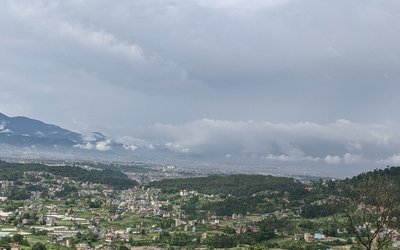The Nepal Communist Party’s (NCP) government that accommodate the former United Marxist Leninist and the Nepal Communist Party Maoists completed the long awaiting Central Committee (CC) meeting with one noteworthy note on the aid package from the United States the Millennium Challenge Cooperation (MCC). The MCC has turned out to be more observable than when it was signed in 2017 by the Nepali Congress led Government. The project under the MCC will be brought to an end in June 2025 starting from June 2020 with the parliament endorsement. PM and Co-Chair Oli is firm to get the MCC endorsed while Prachanda the Co-chair of the NCP reiterated that Nepal could accept US assistance under the MCC Nepal Compact Program after amply clear that the MCC was separate from the Indo-Pacific Strategy (IPS). Nepal has been a constant receiver of assistance from the US tax payers, but the argument remains “why is it that the CC of the NCP was reluctant to decide on the grant that would contribute to energy security and connectivity?
The gossip of the town has been IPS, the MCC and the Belt and Road Initiative (BRI) but the elephants in the room are China and the US. The NCP CC convention concluded with several issues but the main two are: one, the IPS is to contain China and the second is that the signing would assure the US military presence in Nepal.
A three member study team led by former PM Jhalanath Khanal with the Foreign Minister Pradeep Gyawali and Parliament member Bhim Rawal was formed to recommend and clarify the controversial questions whether the parliament should or should not accept the grant assuring a step forward for energy security and connectivity within 10 days. The Standing Committee meeting of the ruling party was not able to decide on the ratification. Gyawali is in support of the proposal while Rawal stalwartly contradicts.
The US Embassy in Kathmandu and visits by high level dignitaries from the US and statement of the Chinese Ambassador comes when political leaders is for and opposing the MCC grant. The MCC came into discussion more after David J Ranz; US Assistant Secretary for South Asia said that MCC is a crucial part of the IPS. The US Ambassador Randy W Berry from time to time and the visiting US Deputy Asst Secretary of State for Public Diplomacy Jonathan Henick said that IPS and MCC are two different entities. IPS is a strategy and a concept while MCC a grant for Nepal’s development efforts. Chinese Ambassador to Nepal Hou Yanqi said “We noticed from the media that political parties, government and parliament are now discussing about ratification of MCC. Nepal is a LDC country and Nepal needs international support and assistance not only from China; actually from the international community. We welcome any kind of assistance to Nepal if it is in the sense of economic cooperation. Whenever it is a kind of economic and trade cooperation we hope the Nepali side can decide on your own feet and not being intervened by other forces.” Nepal has been receiving assistance for its development efforts from many countries including the US, India and China.
IPS that was declared in 2019 is more for promoting the American values and furthering US National Security Strategy and the US Defense policy. The IPS main thrust is a free and open Indo-Pacific refers to the maritime security and security of supply in the Indo-Pacific region. The US Congress in 2004 approved legislation for the establishment of the MCC as an independent bilateral foreign aid agency. The aim is to reduce poverty through economic growth. The low-income and middle-income countries can qualify through competition and cannot succeed unless it is linked to free market policies, good governance and values and democratic principles. Nepal signed for the assistance in 2017. With its inception 37 compacts for 29 countries has been approved worth $13 billion as of 2019 and Nepal is the first South Asian that met 16 out of 20 policy indictors receiving $500 million from the people of the US while Nepal would put $130 million that gives primacy to energy and roadways. The grant is allotted for agriculture and irrigation, education, anti-corruption measures, power and energy, enterprise development, health, transportation, land rights and sanitation and water supply. IPS and MCC are two different conventions.
The NCP CC is divided signals two aspects one is for regaining power either Oli or Prachanda to take advantage of the divided mindset for their charisma when the party is still on the process of uniting and the other is a risk to national security when people’s representatives seem to be influenced of interests of other nations. International assistance does not only come with open arms, it may have string attached that can be overt or covert.
There is understandable indication that India is losing its influence, while China is expanding not just in Nepal but in the other South Asian Nations and the US remain invariable and unwavering. From time and again the US have been stating that the US sees Nepal from its own eyes and not from India’s suggests that US is furthering inroads in Nepal.
The fund will assist setting up a 400KV transmission line running 400 kilometers on the Lapsiphedi-Galchhi-Damauli-Sunauli power corridor. The three substations will connect to the cross-border transmission line with India in Rupendhehi and maintenance of around 300 kilometers of roads on the East West Highway. The outcome of the projects is significant as it provides connectivity that is essential and evens a prospect to furthering Bangladesh-Bhutan-India-Nepal (BBIN) Motor Vehicle Agreement (MVA). The transnational power grid would give Nepal extra mileage in its economic development and the use of resources. This can lead to connectivity and an example for regional intergovernmental organizations extravagant and prospering together.
Disinformation and fake news is a global challenge and Nepal is section of it at the present. Former Defense as well as Home Minister Bhim Rawal has been verbal that the endorsement would furnish US to position its Defense forces in parts of Nepal. Most of the former Maoists leaders have been pointing out that the IPS is to contain China, Nepal’s northern neighbor which would contradict the spirit of Nepal’s foreign policy. US one of the first countries to extend assistance to Nepal and support to the Nepalese Army is a strong bond with immoral character right from 1947.
In 2018 September, nearly a year after Sher Bahadur Deuba-led government scrapped the contract with China Gezhouba Group Company Ltd (CGGCL) for the construction of the 1200 megawatt Budhigandaki hydropower project, a national pride project, a Cabinet meeting decided to award the contract for the project to CGGCL again. There were three political verdicts for the same project offer sufficient substantiation on how flexible governments can be, which depicts lack of trust on Nepal’s political decision makers. Trust is a prerequisite required for international money to come into Nepal for development either through loan, grants, or minimal interest loans. Therefore parliamentary endorsement will pave way for the continuation of the MCC projects to bring to an end. The second requirement of India’s nod will assist Nepal to further its efforts to secure its line of supply in and out of the country.
MCC is political concepts of addressing US approach to assist reduce poverty and help is utilizing Nepal’s resources for economic enhancement. Connectivity for Nepal needs transnational means to implement products and benefit economically. The impact on international diplomacy must be evaluated with relevance as good, cordial and reliable relationship with the US has provided strategic benefits in international diplomacy and international podium.
China’s political influence through economic assistance, defense ties, age old close relationships, and a favorable government is on the increase. The divided mindset for endorsing MCC from the parliament when the bill was registered in July last year is an case in point when NCP holds majority in the parliament.
Nepal’s effort to look beyond its neighborhood is required as part of the global strategic landscape. Geopolitics is altering with two strategic assessments in national capitals world over. You can observe it in the meeting halls of political parties in Kathmandu as well. First is the growing influence of international power and influence by China and now in Kathmandu. Second involves US prioritizing the Indo-Pacific Strategy as the core geopolitical sphere.
Nepal has choices as US still remains the only global power and has great influence in international diplomacy for many years to come, China is a growing power northern neighbor and second economic might as well as India with special close relationship.
Nepal’s answer is to successfully navigate its relationship with all three powers. China is attempting to position itself to design Asia’s security and political architecture. A proactive engagement is necessary with value based democratic governance, supporting a rule-based economic order, and building inclusive, multilateral platforms for Nepal to benefit economically and politically.
Geopolitics no longer deals or trade just with neighbors, Nepal can look for patterns by reframing geopolitics in order to re-examine the past experiencing in the present context with a new perspective and also to try to anticipate the future.
Basnyat is a retired Nepali Army Major General and a political and security Analyst.

Binoj Basnyat
Basnyat is a retired Nepali Army Major General, is a political and security analyst
- Russian Aggression In Ukraine And Outcome In South Asia
- May 05, 2022
- The Nepal Opportunity 2079
- Feb 04, 2022
- Change Of Guards Part -II
- Jan 07, 2022
- How India Lost Post 12-Point Agreement
- Dec 29, 2021
- US Troops Withdrawal From Afghanistan And Implication To South Asia
- Jul 31, 2021














